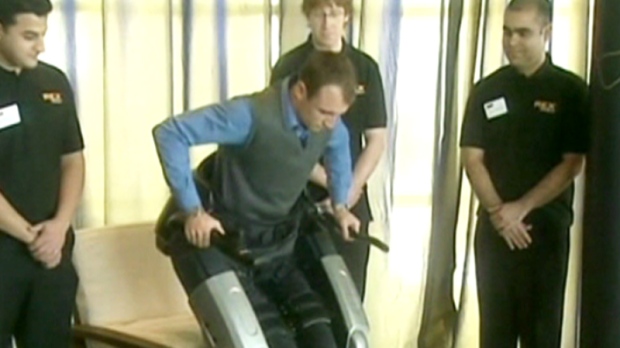A New Zealand man who was told he would never walk again has proved his doctors wrong. Hayden Allen was able to walk on Thursday thanks to a set of secretly-developed robotic legs.
Allen helped unveil the top-secret invention in Auckland Thursday, showing how he could stand up onto previously motionless legs, and then walk across a room to shake hands with New Zealand Prime Minister John Key.
The device he used is called “Rex”, short for “robotic exoskeleton.” It consists of a pair of battery-powered robotic legs that are strapped on around the legs and waist to support the weight of the user.
Using a joystick and a small keypad, Allen showed how he operates the legs to stand, walk, and even go up and down steps. The Rex does have to be custom fitted and Allen says it took about three days to get the hang of using it, but he says he’s able to strap the device on himself, without aid.
Rex is actually the brainchild of Richard Little and Robert Irving, two childhood friends originally from Scotland. They came up with the idea seven years ago, shortly after Irving was diagnosed with multiple sclerosis, a disease that could leave him confined to a wheelchair.
Over the next few years, they refined Rex into a 38kg (84lb) device. All their work was top secret; even Allen, who agreed to be the Rex test pilot, kept his family in the dark about the project until the launch.
“It was all top secret and what we didn’t know, we didn’t need to know anyway. But seeing him here today, it’s just blown us away. It’s brought tears to our eyes really,” Allen’s father told reporters.
Allen has been in a wheelchair since injuring his spinal cord in a motorcycle accident five years ago. When he heard what Little and Irving were planning, he was eager to get on board.
“They brought me in and I said ‘I want to be part of that.’ I couldn’t walk away — or roll away — from that,” he said.
The only other people who knew about the plan were the investors in the venture capital company that put up the $7.5 million needed to create the prototypes.
Now, through a company called Rex Bionics, the device is expected be on the market worldwide by mid-2011. It will cost around $150,000 each — about 20 times the price of a wheelchair. But for people like Allen, no one can put a price on the value of being able to walk again.
